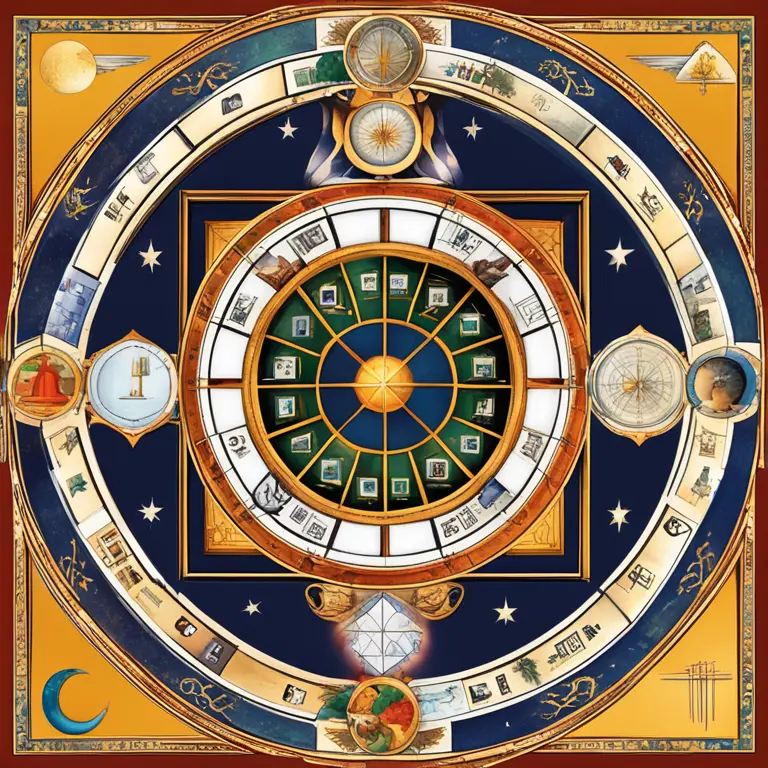
The Significance of Astrological Houses in Chart Interpretation
Delve into the pivotal role astrological houses play in chart analysis and how they influence personal astrological readings.
article by Priya Deshmukh
The Foundation of Astrological Meaning
Astrology is an intricate system that draws meaning from the positions of celestial bodies. One of the fundamental components of an astrological chart is the concept of houses. These segmented divisions of the sky play a crucial role in personal astrology, offering a nuanced layer of interpretation beyond the signs and planets. Each house represents a specific area of an individual's life and contributes to the rich tapestry of personal insight provided by astrology.

The Twelve Houses and Their Symbology
Astrologers divide the celestial sphere into twelve houses, each corresponding to different life areas, such as identity, finances, communication, and relationships. The first house begins with the Ascendant, the sign rising on the eastern horizon at the time of birth, setting the stage for the rest of the houses. Each subsequent house unfolds counter-clockwise, influencing various aspects of a person's experiences and characteristics.

Planetary Placements and House Rulerships
Planets residing in or ruling over houses significantly enhance the meaning found in a birth chart. In 2024 and beyond, as we observe planetary movements, their transits through these houses speak volumes about evolving circumstances and internal growth. Understanding the interaction between current planetary placements and natal house rulerships can offer predictive insights and personal guidance.

Angles and Why They Matter
In astrology, angles formed by the intersection of houses occupy a paramount position. The Ascendant (1st house cusp), Midheaven (10th house cusp), Descendant (7th house cusp), and Imum Coeli (4th house cusp) are the most significant angles, acting as powerful points that shape an individual's core identity, career direction, relationships, and private life. These angles and their related houses anchor the primary energies in a chart.

Interpreting Houses in Personal Forecasts
When crafting astrological forecasts, houses allow for personalized predictions. For example, Jupiter's entrance into the second house in a person's natal chart for the year 2024 can signal a period of prosperity and abundance in financial matters. Meanwhile, Saturn's transit through the seventh house might highlight the need for serious commitment or restructuring in partnerships. This level of specificity is what makes house analysis imperative in astrology.
Integrating Houses with Signs and Planets
The true art of astrological interpretation lies in synthesizing the information from houses, planets, and zodiacal signs. Each house is naturally associated with a zodiac sign and its ruling planet, offering base characteristics. However, the current or natal tenant planets can significantly alter that baseline, creating unique individual narratives—a fact of paramount importance for those seeking guidance in the celestial map.
The Ongoing Evolution of House Importance
As we move through 2024 and onwards, it is vital to recognize that astrology is a living practice, adapting and evolving with time. The importance of houses in interpreting celestial influences remains constant. Yet, the way astrologers apply and contextualize these meanings can shift, as the collective and individual experiences grow and change. The study of houses is thus a perennially dynamic element of astrological learning and discovery.
Published: 1/17/2024
Modified: 1/17/2024
More predictions
Come back here soon to learn more about yourself and your future


The Influence of Astrology in Human Lives
Delve into the impact of astrology on daily life, relationships, and personal growth, and understand how celestial alignments can guide our decisions and self-awareness.


Zodiac Compatibility: Cosmic Matches That Align
Discover which astrology signs mesh well together and why some celestial pairings resonate on a deeper level, paving the way for harmony.


The Astrological Signs of August: Leo and Virgo
Delve into the cosmic influences of August as the vibrant Leo energy transitions into meticulous Virgo in the astrological calendar.